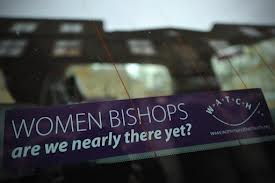So Where Now? After the Synod's 'No'
It’s a dark evening for the Church of
England. The Measure to allow the
ordination of women as bishops failed at the General Synod by six votes in the
house of laity. The Church remains a
place where discrimination on the grounds of gender is permitted. How can we seriously proclaim a God who loves
all people, when we qualify how different groups of people are to be
treated? How can we expect people to
take seriously the discussion tomorrow about the Living Wage when we
institutionalize treating some people as less than others. This is a night of sorrow, of grief and of
anger.
Earlier this evening, leading evening
prayer at the Cathedral I prayed for the Synod (then in the last throws of the
debate) that the Holy Spirit would guide them.
I can’t honestly say that I believe that the result was the will of
God. But that doesn’t mean that there
aren’t things to learn.
First of all, buried in the agony there is
in fact something to celebrate. 42 of
the 44 dioceses voted in favour of the Measure.
In the dioceses, 86% of the Bishops, 76% of the clergy and 77% of the
laity voted for the measure. In the General Synod today the House of Bishops was 94% in favour, 77% of the house of
clergy voted for it and 64% of the House of Laity voted for the Measure. Across the Synod over 76% of the members
voted in favour. Surely it is now time for us end the idiotic notion of a “period of
reception” and fully endorse the ordination of women as the normative practice
of the Church of England.
Second, the structure of the General Synod,
and especially the House of Laity, needs some close examination. When the will of the Church of England is
expressed as clearly as it was by the Dioceses, it is clear that the House of
Laity does not represent the Church of England, nor even the laity of the
Church of England. It is
disproportionately conservative, and the manner of its election needs
scrutiny. It is also made up of those
with the time and resources to travel to London mid-week for a three or four
day meeting. That hardly leads to a
Synod representing the majority of the Church of England. There are hard questions to ask, but they
need to be asked because at the minute the General Synod looks like it is an
unrepresentative body that is bringing the Church into disrepute.
Third, and finally for tonight, there is
already talk of making the legislation better.
I may be alone, but I actually thought the legislation was
excellent. It provided for bishops on
equal terms without watering down their nature. It provided for those opposed to women bishops
by assuring them of a validly ordained male bishop and priest. One of its real strengths was that it
provided for women clergy in a diocese governed by those opposed to the
ordination (and this was too often overlooked).
It dismantled the parallel church built up by Forward in Faith, and gave
us a framework for living together. None
of this should be lost in the coming weeks.
The proposal was just on the right side of coherence. We must not lose that coherence in the name
of getting women on the bench.





Comments
We have to get beyond this barrier - discrimination is not indicative of an "inclusive" church.
Like it or not, we cannot yet say that the ordained ministry of women has been received by the Church of England - the vote would have been far stronger in favour if it had.
But what is the Holy Spirit saying to the Church now, at his time? The next task must be to work on that question. Quite likely part of the answer is the reform of Synod.
Only then should we ask why reception is not yet complete.
Rob and Portia, I agree. Thank you.
Bernard, how strong did the vote need to be? Across the dioceses and the Synod as a whole, over 70% of God's people are in favour of women as bishops. Do we need 80%, 90% 100% agreement? INdeed, even the strongly opposed are this morning saying that they understand we need women bishops, we just need to agree how. Sounds like an end to reception to me.
Helen, thanks for your comment. Please don't confuse the church with the Synod, even if the church lets the Synod make decisions for it!
I would hold to a very high thresh-hold for true Reception. I would say that a doctrine has been Received by the Church if there really isn't any debate anymore. And debate needs to die out naturally, rather than being excluded by some kind of imposed decision. What is not received wihters away; it does not need to be cut from the vine.
That doesn't mean we need unanimity before we move ahead with any decision at all. Reception is one thing, agreeing to differ but move forward together is another. The latter is a perfectly proper thing for a Church to do, and what we should aim to do in this case.
I'm concerned to properly understand Reception, that's all